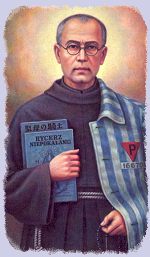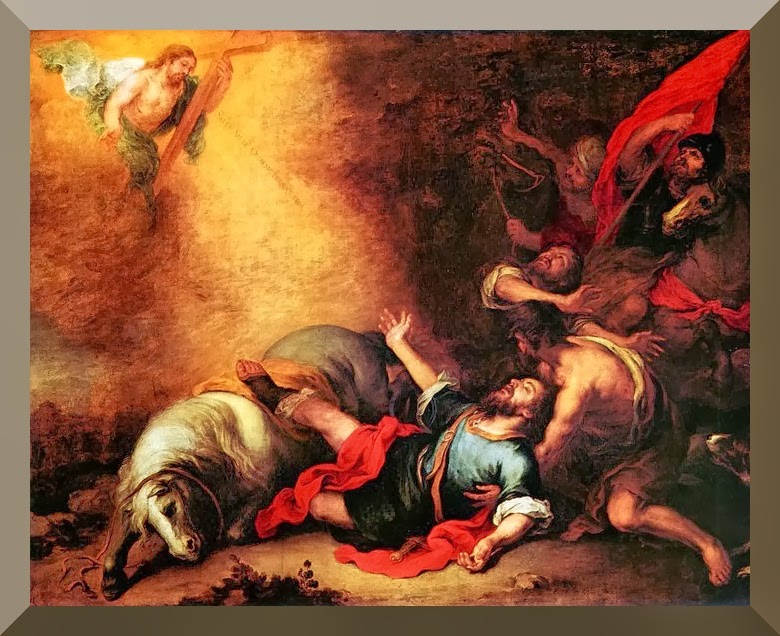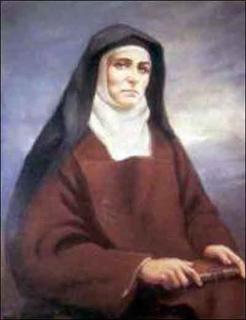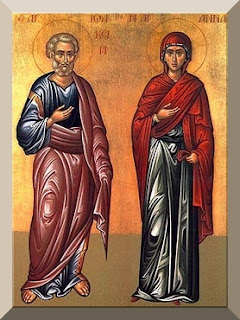
Priest and Martyr
The name of Maximilian Kolbe is synonymous with courage. When we think of the great heroes who died in the savage holocaust brought on by the rabid hatred of the Nazi's one man stands above the others, and that is the life we will now take a closer look at.
Raymond was born in the year 1894 to very devout but poor parents, Jules and Maria Kolbe in the region of Lodz Poland, his parents made their living by weaving. Times were difficult for the Kolbe family as they felt the weight of Russian oppression. But as the Polish people are renowned for their stoic natures and their long suffering perseverance in the face of adversity, this fact would hold the young Raymond in good stead!
As a young boy Raymond always felt an inclination to prayer in solitude, but this is not to say that he was perfect, in that like many of his age he too could be precocious. But there was one singular difference in the young Raymond when at only 10 years old; he was graced with an appearance of the Blessed Mother. It was during this vision that the Blessed Mother offered Raymond a choice of two crowns one which was white which stood for purity and the other was red which stood for martyrdom. Raymond was never one to hold back so he immediately responded to this most beautiful lady that he chose both!
Raymond would certainly live out what our Lady had offered him in his short but very holy life. This vision made a big difference to the choices Raymond would make in life, for he took our Lady's word seriously and lived to be obedient, from this time forward Raymond had a burning desire to enter the Priesthood. But due to the poverty of the family this was thought to be an impossible dream, as his parents relied on their children to help them survive during this difficult period in Polish history.
But Raymond did not give up hope, and because of his obvious devoutness a business man took Raymond under his wing and helped tutor him, which was also a preparation for his long held dream to become a Priest.
Being that both Jules and Maria had set a good example all three of their sons exhibited a wish to enter Holy Orders. At first the parents were perturbed as to what would become of them once they could no longer provide a living for themselves. But being so very devout they entrusted their futures to God just as they did their son's.
Soon both Francis and Raymond would enter the Seminary run by the Franciscan Order, a few years later they were joined by their youngest brother. But Francis would eventually leave the Order much to the sorrow of his younger brother Raymond. Being that all their children had entered the Seminary, both Jules and Maria Kolbe decided that they too would embrace the Religious life.
And as Raymond completed his studies in physics and mathematics, he was then accepted into the novitiate of Conventual Franciscans in the year 1910 and upon taking his first Vows he then took the name Maximilian, and proceeded to study philosophy in Krakow, which he then completed in Rome.
It was while he was in Rome that Maximilian had the honour of attending a public audience with another future Saint, Pope Pius X. Maximilian then gained his degrees in both philosophy and theology, it would be four years later that Maximilian would be ordained into the Priesthood, whereupon he added the name Maria as part of his Religious name. For despite all the study Maximilian had a strong devotion to our Lady and also kept a strong prayer life in the solitude of his soul.
Maximilian and Pope Pius X also had another thing in common as both showed concerns towards the acceptance of 'modernism' within the Church; this was anathema to both of these holy men of God!
And it would be this trend towards modernism that fired the heart of Fr. Maximilian to combat it with all his might. It was here that the thought of beginning an army of fellow Priests to spread love and devotion to our most Holy Mother began to take affect. So began the Militia of the Immaculata, for Fr. Maximilian was not one to sit and do nothing, he was a man of fierce courage and conviction which showed in all he did as an obedient son of the Church.
Maximilian was never timid it was simply not in his nature and so he faced up to the challenges of those who were trying to erode the faithful by lies and deceit. Those who wished to join him in this crusade against heresies were asked to consecrate themselves to the Virgin Mary and to always wear the Miraculous Medal, it would not take long before this movement became world wide and lasts to the present day!
Due to Fr. Maximilian many duties and his total commitment to serving our Lady would soon take a heavy toll on the young Priests health and he was to spend time recuperating in hospitals. This was a difficult time for one so spiritually robust and with such a definite purpose in life.
So though Fr. Maximilian was recovering his health in hospital this did not stop him from sharing his ideals as a printing press was brought forth in order to print out his mission and make true his pledge to the Blessed Mother. To be her vigilant soldiers of the Faith so was born the periodical 'Knights of the Immaculate Mother', which soon gathered speed amongst the faithful.
One is amazed at the strength exhibited by this one man, his vision which was enormous but never grandiose. For all the work he did was in order to serve the Church and to make known the love of the Blessed Mother to all her children. His iron will and determination to forge ahead seemed indomitable to all those he came in contact with. Maximilian had always been a zealous soul, from a precious young lad to a determined and strong willed individual, he lived to do the Will of the Father just as Mary had done.
To further the cause of the Knights of the Immaculata, Maximilian would travel to Japan and India to raise awareness of the Saving Grace of Jesus Christ and the love of the Blessed Mother. In Japan Fr. Maximilian began a monastery of men who would devote their lives to serving God. But once again Fr. Maximilian was also beginning to feel the affects of an illness that had plagued him for many years and so in 1936 he had to return to his native Poland.
He returned to a Poland where rumours of war were beginning to gather speed. And so in 1939 war enveloped Poland and its people which would bring untold suffering and tragedy to an enormous amount of people. And as the Nazi's made their presence known the shadow of the red crown would follow Fr. Maximilian for the rest of his remaining days.
Soon Fr. Maximilian and his fellow friars would be hiding Jews and others on the run from the ever evil tentacles of the Nazi's whose blood lust knew no boundaries. When the Nazi's tried to make Fr. Maximilian print Pro-Nazi propaganda he adamantly refused to obey this directive! The Nazi officials took this to be a sign of further troubles they may have with this courageous man who had no fear of them or what they could do to him!
The Nazi's were incensed that they could not intimidate this fiercely loyal son of the Church, and so they arrested him and four other friars for hiding Jews and resistance fighters. Fr. Maximilian would be deported to the infamous concentration camp at Auschwitz in 1941.
Throughout this terrible ordeal Maximilian never lost hope nor became discouraged but instead faced true evil with complete love and self abandonment as he tried to help his fellow man. And though Fr. Maximilian's health was always frail still he would help out others as they struggled with the heavy workload. Once again we witness the enormous strength and will of this spiritual giant!
But in July a group of men had escaped this tomb of death that was Auschwitz, the Nazi's for retaliation then ordered the massacre of a group of men, and it was here that one man cried, "My wife, my children, I shall never see them again!" Father Maximilian upon hearing this piteous cry then stepped out and addressed the SS officer and asked to be exchanged so that the man with the children could live. What courage and what character, as Fr. Maximilian embraced the Red Crown of Martyrdom.
After suffering terrible torments in cell block 18, where the men who were chosen to die were consoled by this remarkable Priest as he read out prayers and encouraged the others to take heart and not to allow fear to override them. The voices of the tortured men soon turned from fear into love as they sang hymns and recited the Rosary as this brave Priest led them soon they all died as peacefully as possible surrounded by the loving voice of this remarkable Saint. Father Maximilian would be the last to die where upon the Nazi's who had grown frustrated with the waiting finally entered his cell and with a needle full of acid they injected this deadly poison into the veins of the gently smiling Priest.
Father Maximilian Maria Kolbe died in 1941.
Saint Maximilian Kolbe was canonized in 1982 by Pope John Paul II.
Some Quotes
"Courage, my sons, Don't you see that we are leaving on a mission? They pay our fare in the bargain. What a piece of good luck! The thing to do now is to pray well in order to win as many souls as possible. Let us, then, tell the Blessed Virgin that we are content, and that she can do with us anything she wishes."
"The most deadly poison of our times is indifference. And this happens, although the praise of God should know no limits. Let us strive, therefore, to praise Him to the greatest extent of our powers."
"No one in the world can change Truth. What we can do and should do is to seek truth and to serve it when we have found it. The real conflict is the inner conflict. Beyond armies of occupation and the hecatombs of extermination camps, there are two irreconcilable enemies in the depth of every soul: good and evil, sin and love. And what use are the victories on the battlefield if we ourselves are defeated in our innermost personal selves?"
"For Jesus Christ I am prepared to suffer still more."

Franciszek Gajowniczek the man who was saved.













